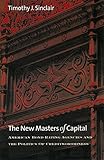The New Masters of Capital : American Bond Rating Agencies and the Politics of Creditworthiness / Timothy J. Sinclair.
Material type: TextSeries: Cornell Studies in Political EconomyPublisher: Ithaca, NY : Cornell University Press, [2014]Copyright date: ©2014Description: 1 online resource (202 p.) : 1 graph, 7 tables, 3 line drawingsContent type:
TextSeries: Cornell Studies in Political EconomyPublisher: Ithaca, NY : Cornell University Press, [2014]Copyright date: ©2014Description: 1 online resource (202 p.) : 1 graph, 7 tables, 3 line drawingsContent type: - 9780801474910
- 9780801471780
- 332.63/23/0973
- HG3751.7.S56 2005eb
- online - DeGruyter
- Issued also in print.
| Item type | Current library | Call number | URL | Status | Notes | Barcode | |
|---|---|---|---|---|---|---|---|
 eBook
eBook
|
Biblioteca "Angelicum" Pont. Univ. S.Tommaso d'Aquino Nuvola online | online - DeGruyter (Browse shelf(Opens below)) | Online access | Not for loan (Accesso limitato) | Accesso per gli utenti autorizzati / Access for authorized users | (dgr)9780801471780 |
Frontmatter -- CONTENTS -- TABLES AND FIGURES -- Preface -- 1. Introduction -- 2. Good, Bad, or Indifferent : The Emergence of Rating -- 3. Unconscious Power -- 4. Rating Corporations -- 5. Rating State and Local Governments -- 6. Global Growth of the Rating Business -- 7. Blown Calls: Rating Challenges and Crises -- 8. A New Constellation of Power -- Index
restricted access online access with authorization star
http://purl.org/coar/access_right/c_16ec
In The New Masters of Capital, Timothy J. Sinclair examines a key aspect of the global economy-the rating agencies. In the global economy, trust is formalized in the daily operations of such firms as Moody's and Standard & Poor's, which continuously monitor the financial health of bond-issuers ranging from private corporations to local and national governments. Their judgments affect unimaginably large sums, approximately $30 trillion in outstanding debt issues, according to a recent Moody's estimate. The difference between an AA and a BB rating may cost millions of dollars in interest payments or determine if a corporation or government can even issue bonds.Without bond rating agencies, there would be no standard means to compare risks in the global economy, and international investment would be problematic. Most observers assume that the agencies are neutral and scientific, and that they interpret their role in narrowly economic terms. But these agencies, by their nature, wield extraordinary power and exert massive influence over public policy. Sinclair offers a highly accessible account of these institutions, their origins, and the rating processes they use to judge creditworthiness. Illustrated with a wide range of cases, this book offers a fresh assessment of the role of an often-overlooked institution in the dynamics of modern global capitalism.
Issued also in print.
Mode of access: Internet via World Wide Web.
In English.
Description based on online resource; title from PDF title page (publisher's Web site, viewed 29. Mrz 2022)


